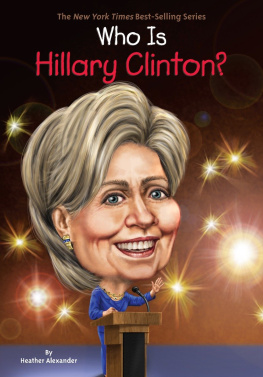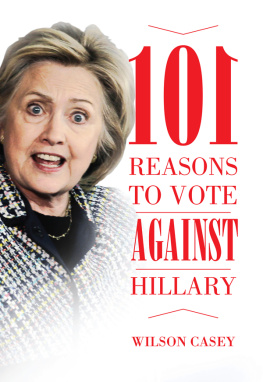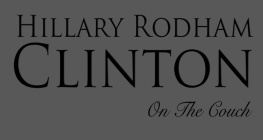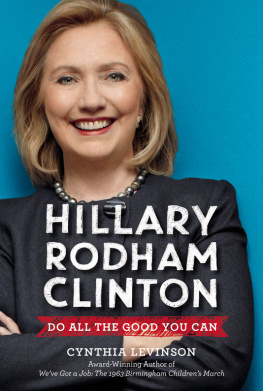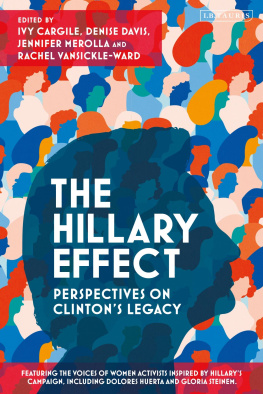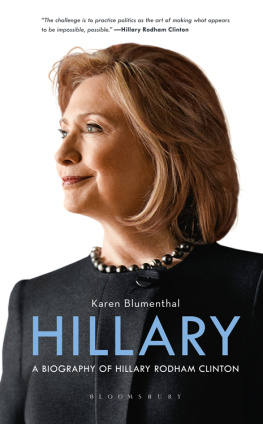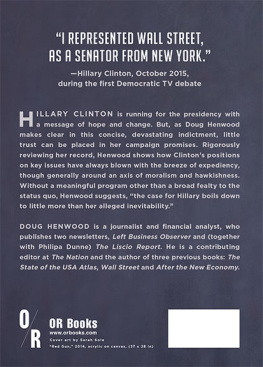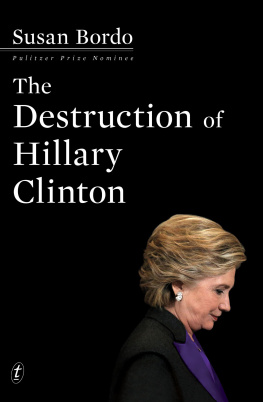PAUL KENGOR, P H .D.
Writing a book on the faith of Hillary Rodham Clinton has been a fascinating but frustrating process. On the latter, many of the sources contacted or consulted in the course of researching and writing this book had some type of problem. With my previous two faith-based subjects, Ronald Reagan and George W. Bush, I found that while pastors commonly respected a level of confidentiality concerning their congregation and were often unwilling to share personal material on the subjects, friends and associates were typically happy to talk. For Reagan in particular, many were eager to finally get the word out and set the record straight on the mans deep, unappreciated faith. As a man who is quite open about his faith, George W. Bush was also an easier subject.
Since I began writing this spiritual biography of Hillary Clinton, however, I encountered a real reluctance among some who knew her through church to talk about their experiences with her, fearing the information would be used against Hillaryeven in instances when it was positive. Secondary sources were likewise problematic, as many biographers lionize or demonize Hillary and her husband, sometimes reporting sensational stories thateven when seemingly plausibleare based on unnamed or flawed sources. Much of this problematic research often does not use endnotes and frequently repeats the previous writers unsourced material.
Moreover, many sources, as the Clintons themselves have complained, report explosive sexual innuendomaterial that in certain cases has been confirmed, at times through the controversial work of official government investigators. This means that a biographer of the Clintons is sometimes forced to delve into the lurid in explaining themuncharted waters to a college professor like me. Unfortunately, one cannot talk about the Clintons and their relationship, and particularly their spiritual relationship, without discussing this elephant in the bedroom, since it has been a dominant element of their marriage, their faith, and their very public lives.
And then there are the most problematic sources of all: the Clintons. Like them or not, the fact is that Hillary and Bill Clinton may be the most thoroughly political first couple in the history of American politics. More, they are leftists, once radical leftists, who have learned to campaign to the middle and to moderate stances on key swing issues in order to get elected. Of course, many politicians do this, but the Clintons do so more frequently than any politicians on the left or right, and as a result, they are not always fully forthcoming about what they believe, which makes reporting on them so sticky and, for the biographer, risky.
This was a hurdle I faced when teaching my students about President Bill Clinton. For most presidents I lectured on, whether Democrat or Republican, writing their beliefs on the chalkboard was a fairly straightforward process. With Bill Clinton, that was always a struggle because of that unique political element. What does he truly believe? It was a question similar to that famously expressed by an exasperated James Carville, Clintons colorful ragin Cajun political adviser, who banged the table and asked of his boss, Wheres the sacred ground?! Or, as Washington Post reporter and talented Clinton biographer David Maraniss has put it, the perpetual question that hangs over Bill Clinton is the question of what he really stands for.1
While Bill and Hillary are truly distinct politicians, what applies in this regard to Bill partly applies to Hillary as well. Indeed, Hillary often advised her husband to adopt this political approach and honed the tactic herself at the side of the master. Now she, too, holds elected office and seeks the highest office in the land, looking to position herself as a moderate, just as her husband did.
This challenge regarding the Clintons becomes even more difficult when trying to address the subject of religion. The 2004 election reaffirmed what many DemocratsHillary foremost among themnow understand: A modern liberal campaigning for president must appear at least partly religious, or at least not unreligious or antireligious. The Democratic Party responded astutely, employing an impressive example of correctly reading the electorate. In 2006, the Democratic Party leadership captured the Congress in large part by running moderate, religious, at times even pro-life candidates, embodied by the likes of Bob Casey Jr. in Pennsylvania.
Hillary and her husband recognized the political potency of religion long before religiously minded voters helped George W. Bush win consecutive presidential elections. Both have unapologetically campaigned in churches more brazenly than politicians in either party, and at times (in Mrs. Clintons case) in racially polarizing ways. The secular pressin an example of striking hypocrisyhas winked at the behavior, allowing the Clintons full immunity in pursuing this integration of church and state, in a manner that George W. Bush would not have been able to get away with, even if he so desired.
These Clintonian dashes to the middle for political positioning are a real problem for a biographer. Time and time again in researching and writing this book, I was left to conclude that on certain religious questions, the only sources who truly know the answer are God, Hillary, and possibly Bill Clinton. One source would say one thing while another source would say something else. Finally Hillary (or Bill) would weigh in with yet another version of an idea, creating a vague gray area of truth and leading to treacherous ground for a biographer.
That said, some things regarding Hillary Clinton and her faith are clear: Although no one can profess to know any individuals heart and soul, there seems no question that Hillary is a sincere, committed Christian and has been since childhood. The same applies to her husband, who admits that he is a sinneras are all Christians, which is why they are Christians. Surely not even the most cynical right-winger would insist that Hillary and Bill were playing politics when they eagerly attended Sunday school as eight-year-olds. Hillary is a very liberal Christian, and would be categorized as part of the religious left, along with millions of Christian Americansa designation that seems to have disappeared from the medias lexicon now that the secular press is obsessed with fears over the religious right.
The faith of both of the Clintons affects their lives and their politics. Mrs. Clinton has not been shy about incorporating her faith into the policies she advocates, and probably does so as much as well-known religious politicians on the right, such as the current president. If ever confronted with the charge from the usually vigilant church-state-separation media, she (and her husband) would be hard pressed to dodge the obvious assertion that they have at times exploited their religious faith for political purposes.
The greatest paradox of Mrs. Clintons faith, the one that will hurt her most in her bid to attract those values voters she needs in 2008including even a sliver of the churchgoing Catholics and Protestants who overwhelmingly went for Bushis the way her Christian faith has reinforced her commitment to human rights when it comes to civil rights and childrens rights and gay rights, but not the rights of unborn children, where her faith has given way to her ideology. There is no issue more impassioning to Senator Clinton than abortion rights, meaning that any serious analysis of her political-religious thinking is forced to devote a significant amount of attention to the subject, as she does herself in her own personal and professional life.2


